Analysis of External Forces and Banham Poultry Limited's Response
VerifiedAdded on 2020/01/16
|15
|5075
|177
Report
AI Summary
This report analyzes Banham Poultry Limited, a UK-based poultry firm, examining the primary external forces impacting its operations. The report begins with an overview of these forces, including economic conditions, political factors (such as Brexit and international conflicts), social factors (demographic shifts and changing consumer preferences), technological advancements (sustainable practices and automation), legal issues (animal welfare regulations), and environmental factors (climate change and feed costs). The report then delves into the increasing international economic integration, focusing on trade and investment, particularly in the context of the poultry industry. It analyzes the relevance of international economic integration to Banham, examining trade in poultry meat and eggs, trade liberalization, and tariff protection. The report also evaluates the effectiveness of Banham's responses to these external forces, considering production and employment responses, and identifies areas for improvement in the organization's strategies. The report uses various sources to support its findings and provides a comprehensive overview of the challenges and opportunities faced by Banham Poultry Limited in a dynamic business environment.
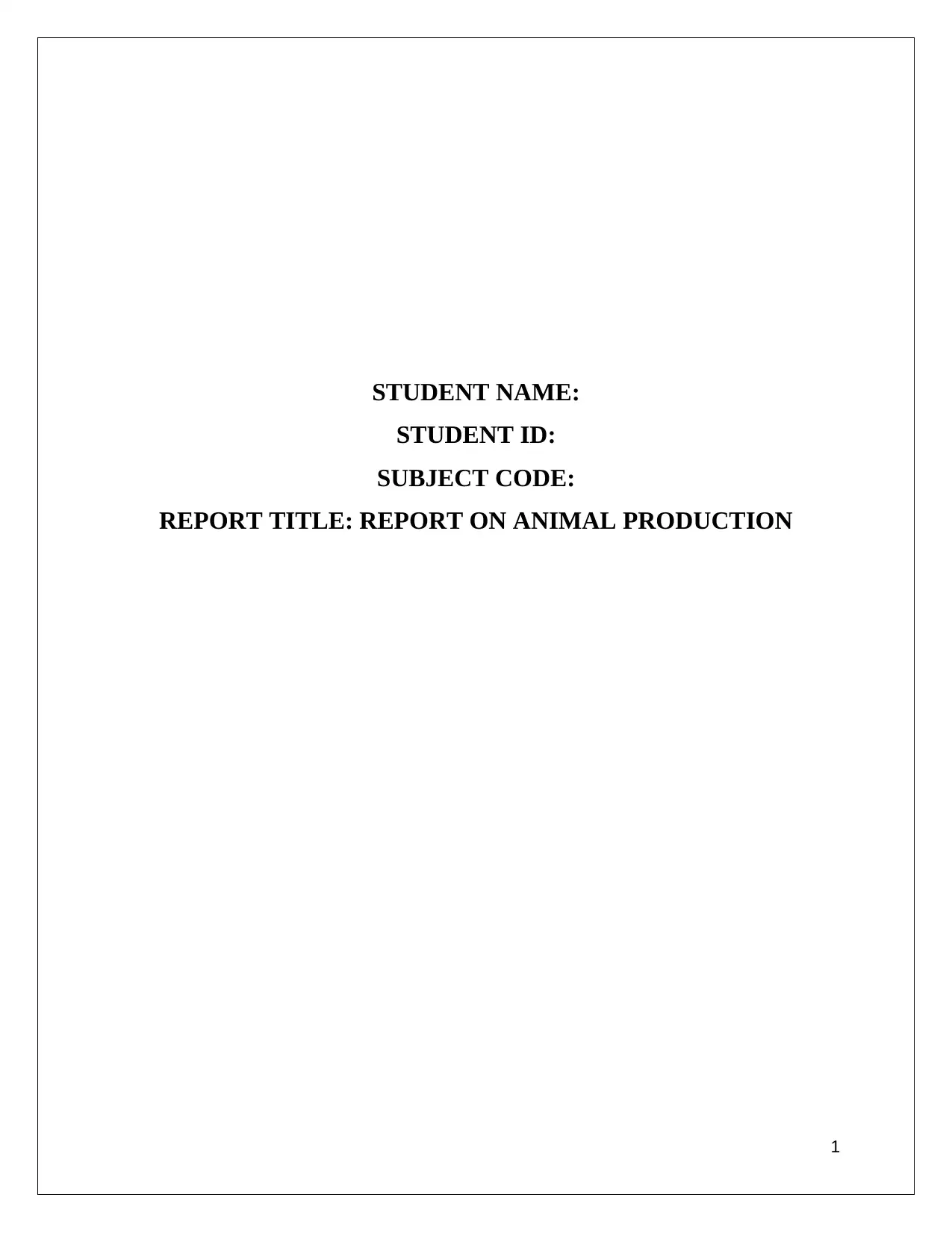
STUDENT NAME:
STUDENT ID:
SUBJECT CODE:
REPORT TITLE: REPORT ON ANIMAL PRODUCTION
1
STUDENT ID:
SUBJECT CODE:
REPORT TITLE: REPORT ON ANIMAL PRODUCTION
1
Paraphrase This Document
Need a fresh take? Get an instant paraphrase of this document with our AI Paraphraser
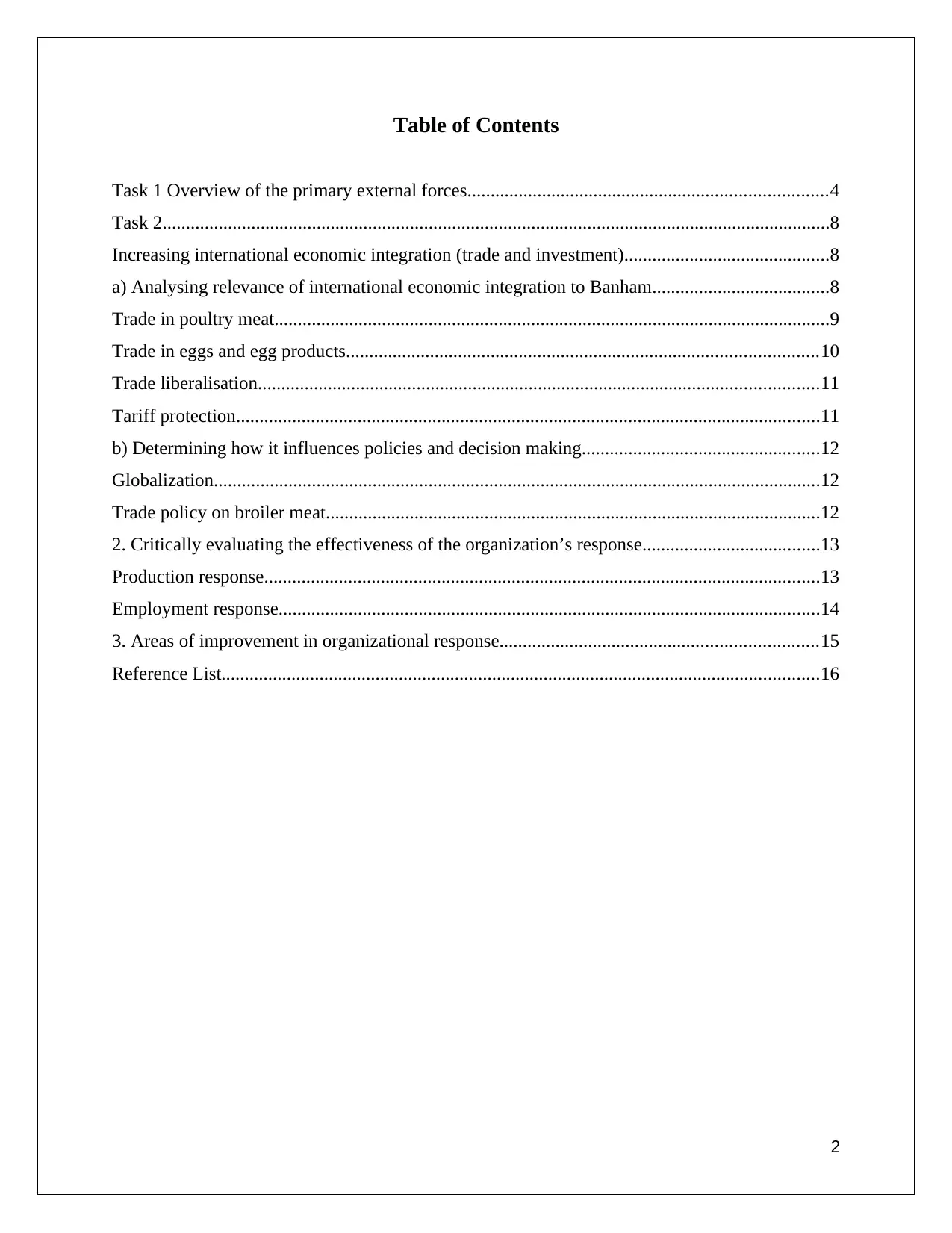
Table of Contents
Task 1 Overview of the primary external forces.............................................................................4
Task 2...............................................................................................................................................8
Increasing international economic integration (trade and investment)............................................8
a) Analysing relevance of international economic integration to Banham......................................8
Trade in poultry meat.......................................................................................................................9
Trade in eggs and egg products.....................................................................................................10
Trade liberalisation........................................................................................................................11
Tariff protection.............................................................................................................................11
b) Determining how it influences policies and decision making...................................................12
Globalization..................................................................................................................................12
Trade policy on broiler meat..........................................................................................................12
2. Critically evaluating the effectiveness of the organization’s response......................................13
Production response.......................................................................................................................13
Employment response....................................................................................................................14
3. Areas of improvement in organizational response....................................................................15
Reference List................................................................................................................................16
2
Task 1 Overview of the primary external forces.............................................................................4
Task 2...............................................................................................................................................8
Increasing international economic integration (trade and investment)............................................8
a) Analysing relevance of international economic integration to Banham......................................8
Trade in poultry meat.......................................................................................................................9
Trade in eggs and egg products.....................................................................................................10
Trade liberalisation........................................................................................................................11
Tariff protection.............................................................................................................................11
b) Determining how it influences policies and decision making...................................................12
Globalization..................................................................................................................................12
Trade policy on broiler meat..........................................................................................................12
2. Critically evaluating the effectiveness of the organization’s response......................................13
Production response.......................................................................................................................13
Employment response....................................................................................................................14
3. Areas of improvement in organizational response....................................................................15
Reference List................................................................................................................................16
2
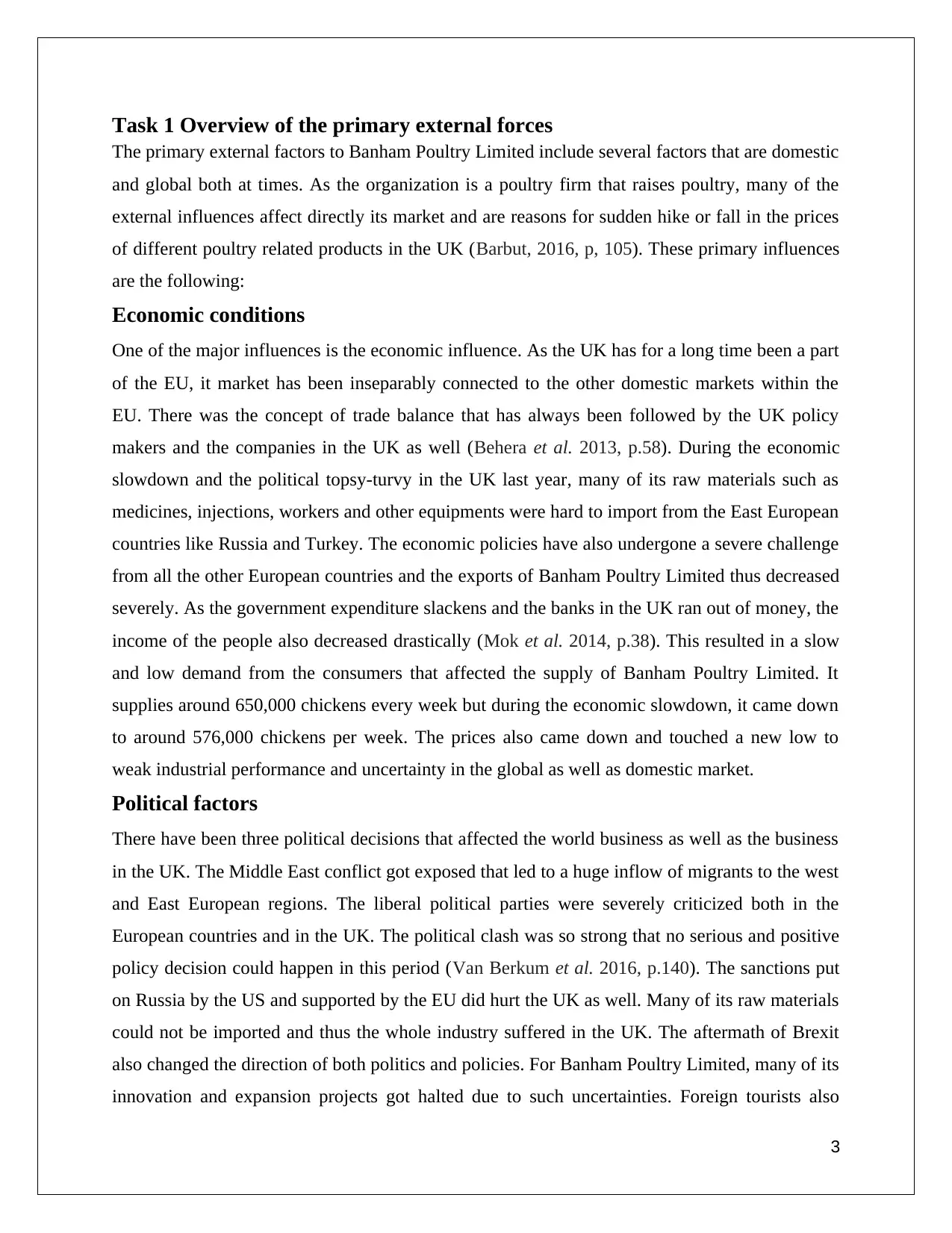
Task 1 Overview of the primary external forces
The primary external factors to Banham Poultry Limited include several factors that are domestic
and global both at times. As the organization is a poultry firm that raises poultry, many of the
external influences affect directly its market and are reasons for sudden hike or fall in the prices
of different poultry related products in the UK (Barbut, 2016, p, 105). These primary influences
are the following:
Economic conditions
One of the major influences is the economic influence. As the UK has for a long time been a part
of the EU, it market has been inseparably connected to the other domestic markets within the
EU. There was the concept of trade balance that has always been followed by the UK policy
makers and the companies in the UK as well (Behera et al. 2013, p.58). During the economic
slowdown and the political topsy-turvy in the UK last year, many of its raw materials such as
medicines, injections, workers and other equipments were hard to import from the East European
countries like Russia and Turkey. The economic policies have also undergone a severe challenge
from all the other European countries and the exports of Banham Poultry Limited thus decreased
severely. As the government expenditure slackens and the banks in the UK ran out of money, the
income of the people also decreased drastically (Mok et al. 2014, p.38). This resulted in a slow
and low demand from the consumers that affected the supply of Banham Poultry Limited. It
supplies around 650,000 chickens every week but during the economic slowdown, it came down
to around 576,000 chickens per week. The prices also came down and touched a new low to
weak industrial performance and uncertainty in the global as well as domestic market.
Political factors
There have been three political decisions that affected the world business as well as the business
in the UK. The Middle East conflict got exposed that led to a huge inflow of migrants to the west
and East European regions. The liberal political parties were severely criticized both in the
European countries and in the UK. The political clash was so strong that no serious and positive
policy decision could happen in this period (Van Berkum et al. 2016, p.140). The sanctions put
on Russia by the US and supported by the EU did hurt the UK as well. Many of its raw materials
could not be imported and thus the whole industry suffered in the UK. The aftermath of Brexit
also changed the direction of both politics and policies. For Banham Poultry Limited, many of its
innovation and expansion projects got halted due to such uncertainties. Foreign tourists also
3
The primary external factors to Banham Poultry Limited include several factors that are domestic
and global both at times. As the organization is a poultry firm that raises poultry, many of the
external influences affect directly its market and are reasons for sudden hike or fall in the prices
of different poultry related products in the UK (Barbut, 2016, p, 105). These primary influences
are the following:
Economic conditions
One of the major influences is the economic influence. As the UK has for a long time been a part
of the EU, it market has been inseparably connected to the other domestic markets within the
EU. There was the concept of trade balance that has always been followed by the UK policy
makers and the companies in the UK as well (Behera et al. 2013, p.58). During the economic
slowdown and the political topsy-turvy in the UK last year, many of its raw materials such as
medicines, injections, workers and other equipments were hard to import from the East European
countries like Russia and Turkey. The economic policies have also undergone a severe challenge
from all the other European countries and the exports of Banham Poultry Limited thus decreased
severely. As the government expenditure slackens and the banks in the UK ran out of money, the
income of the people also decreased drastically (Mok et al. 2014, p.38). This resulted in a slow
and low demand from the consumers that affected the supply of Banham Poultry Limited. It
supplies around 650,000 chickens every week but during the economic slowdown, it came down
to around 576,000 chickens per week. The prices also came down and touched a new low to
weak industrial performance and uncertainty in the global as well as domestic market.
Political factors
There have been three political decisions that affected the world business as well as the business
in the UK. The Middle East conflict got exposed that led to a huge inflow of migrants to the west
and East European regions. The liberal political parties were severely criticized both in the
European countries and in the UK. The political clash was so strong that no serious and positive
policy decision could happen in this period (Van Berkum et al. 2016, p.140). The sanctions put
on Russia by the US and supported by the EU did hurt the UK as well. Many of its raw materials
could not be imported and thus the whole industry suffered in the UK. The aftermath of Brexit
also changed the direction of both politics and policies. For Banham Poultry Limited, many of its
innovation and expansion projects got halted due to such uncertainties. Foreign tourists also
3
⊘ This is a preview!⊘
Do you want full access?
Subscribe today to unlock all pages.

Trusted by 1+ million students worldwide
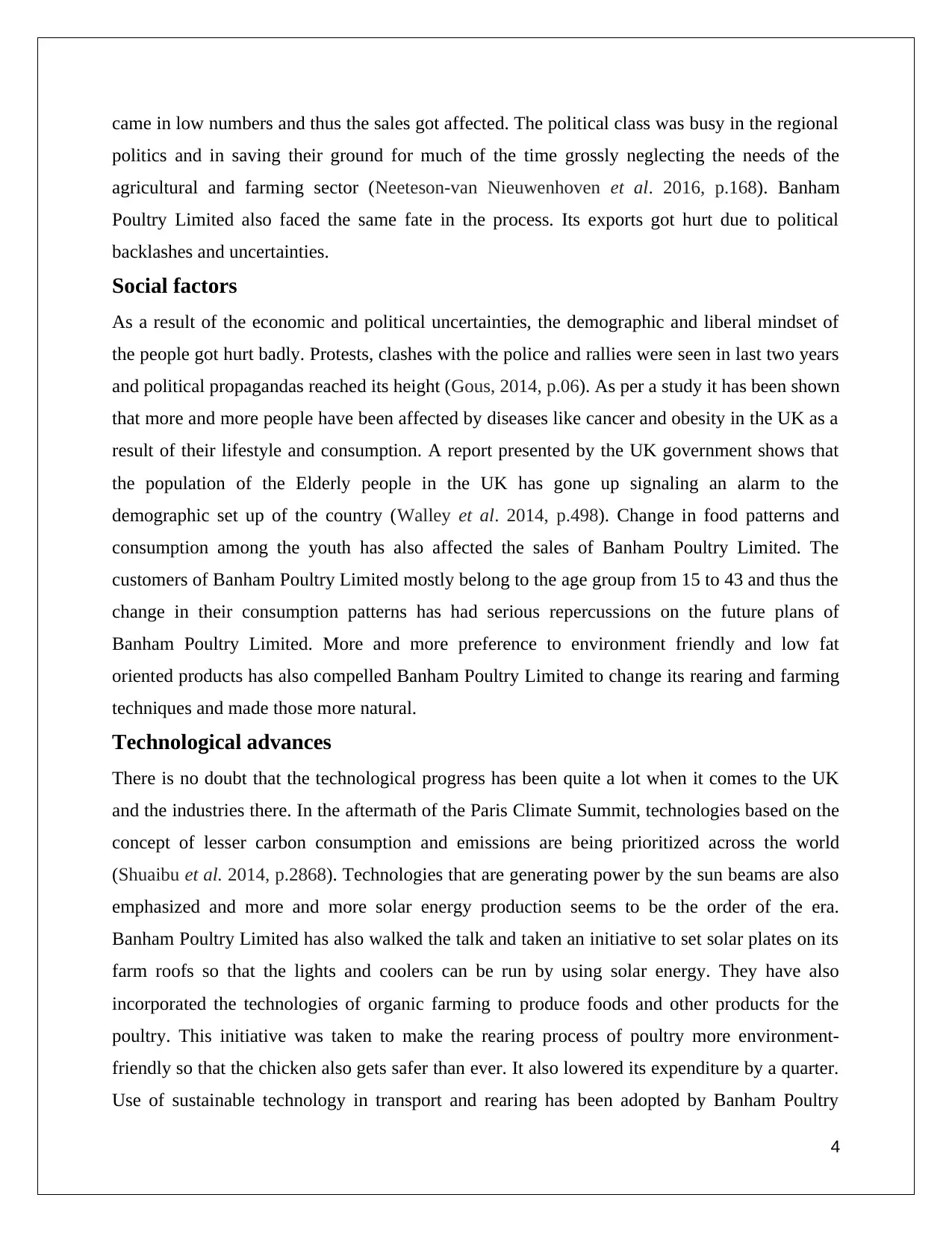
came in low numbers and thus the sales got affected. The political class was busy in the regional
politics and in saving their ground for much of the time grossly neglecting the needs of the
agricultural and farming sector (Neeteson-van Nieuwenhoven et al. 2016, p.168). Banham
Poultry Limited also faced the same fate in the process. Its exports got hurt due to political
backlashes and uncertainties.
Social factors
As a result of the economic and political uncertainties, the demographic and liberal mindset of
the people got hurt badly. Protests, clashes with the police and rallies were seen in last two years
and political propagandas reached its height (Gous, 2014, p.06). As per a study it has been shown
that more and more people have been affected by diseases like cancer and obesity in the UK as a
result of their lifestyle and consumption. A report presented by the UK government shows that
the population of the Elderly people in the UK has gone up signaling an alarm to the
demographic set up of the country (Walley et al. 2014, p.498). Change in food patterns and
consumption among the youth has also affected the sales of Banham Poultry Limited. The
customers of Banham Poultry Limited mostly belong to the age group from 15 to 43 and thus the
change in their consumption patterns has had serious repercussions on the future plans of
Banham Poultry Limited. More and more preference to environment friendly and low fat
oriented products has also compelled Banham Poultry Limited to change its rearing and farming
techniques and made those more natural.
Technological advances
There is no doubt that the technological progress has been quite a lot when it comes to the UK
and the industries there. In the aftermath of the Paris Climate Summit, technologies based on the
concept of lesser carbon consumption and emissions are being prioritized across the world
(Shuaibu et al. 2014, p.2868). Technologies that are generating power by the sun beams are also
emphasized and more and more solar energy production seems to be the order of the era.
Banham Poultry Limited has also walked the talk and taken an initiative to set solar plates on its
farm roofs so that the lights and coolers can be run by using solar energy. They have also
incorporated the technologies of organic farming to produce foods and other products for the
poultry. This initiative was taken to make the rearing process of poultry more environment-
friendly so that the chicken also gets safer than ever. It also lowered its expenditure by a quarter.
Use of sustainable technology in transport and rearing has been adopted by Banham Poultry
4
politics and in saving their ground for much of the time grossly neglecting the needs of the
agricultural and farming sector (Neeteson-van Nieuwenhoven et al. 2016, p.168). Banham
Poultry Limited also faced the same fate in the process. Its exports got hurt due to political
backlashes and uncertainties.
Social factors
As a result of the economic and political uncertainties, the demographic and liberal mindset of
the people got hurt badly. Protests, clashes with the police and rallies were seen in last two years
and political propagandas reached its height (Gous, 2014, p.06). As per a study it has been shown
that more and more people have been affected by diseases like cancer and obesity in the UK as a
result of their lifestyle and consumption. A report presented by the UK government shows that
the population of the Elderly people in the UK has gone up signaling an alarm to the
demographic set up of the country (Walley et al. 2014, p.498). Change in food patterns and
consumption among the youth has also affected the sales of Banham Poultry Limited. The
customers of Banham Poultry Limited mostly belong to the age group from 15 to 43 and thus the
change in their consumption patterns has had serious repercussions on the future plans of
Banham Poultry Limited. More and more preference to environment friendly and low fat
oriented products has also compelled Banham Poultry Limited to change its rearing and farming
techniques and made those more natural.
Technological advances
There is no doubt that the technological progress has been quite a lot when it comes to the UK
and the industries there. In the aftermath of the Paris Climate Summit, technologies based on the
concept of lesser carbon consumption and emissions are being prioritized across the world
(Shuaibu et al. 2014, p.2868). Technologies that are generating power by the sun beams are also
emphasized and more and more solar energy production seems to be the order of the era.
Banham Poultry Limited has also walked the talk and taken an initiative to set solar plates on its
farm roofs so that the lights and coolers can be run by using solar energy. They have also
incorporated the technologies of organic farming to produce foods and other products for the
poultry. This initiative was taken to make the rearing process of poultry more environment-
friendly so that the chicken also gets safer than ever. It also lowered its expenditure by a quarter.
Use of sustainable technology in transport and rearing has been adopted by Banham Poultry
4
Paraphrase This Document
Need a fresh take? Get an instant paraphrase of this document with our AI Paraphraser
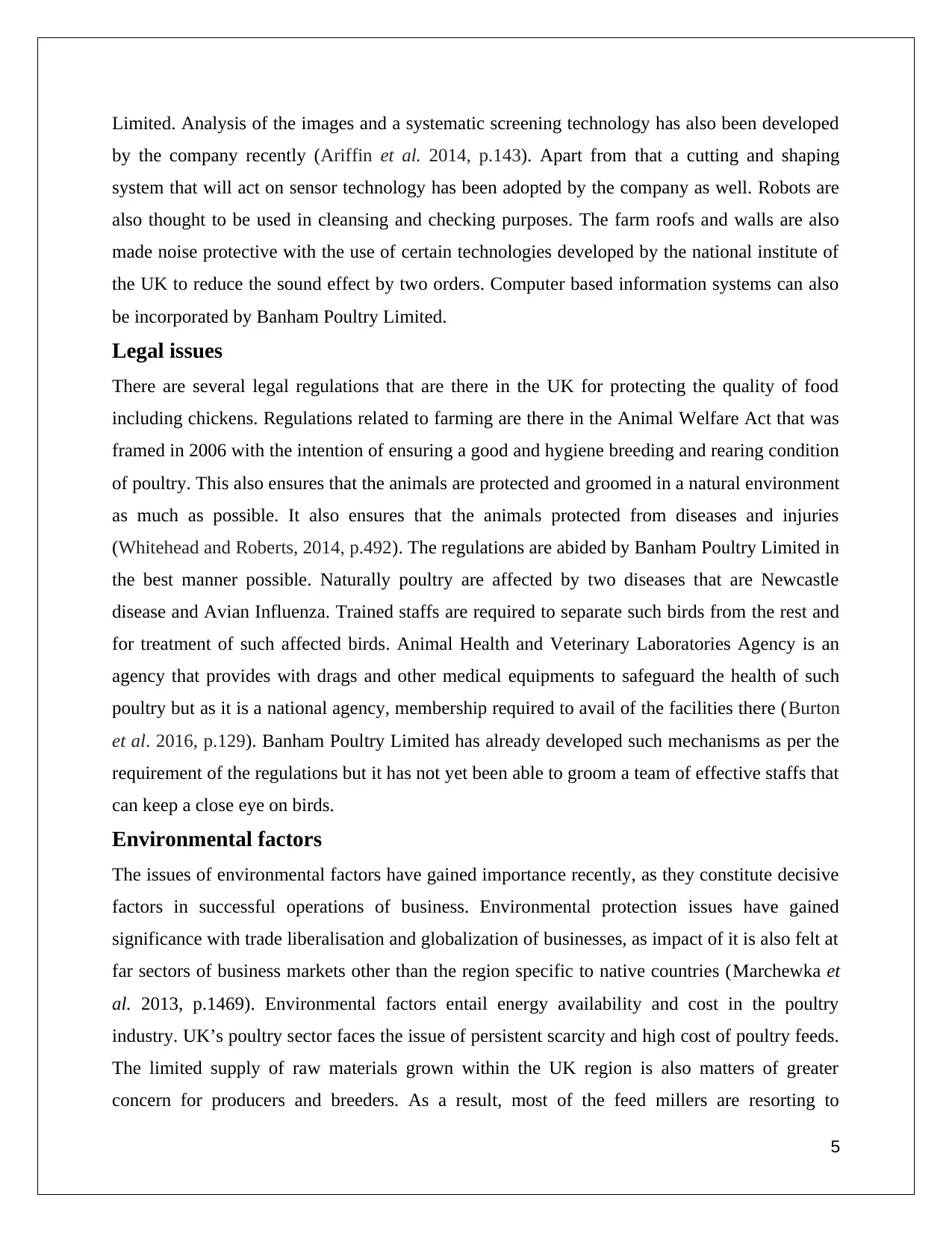
Limited. Analysis of the images and a systematic screening technology has also been developed
by the company recently (Ariffin et al. 2014, p.143). Apart from that a cutting and shaping
system that will act on sensor technology has been adopted by the company as well. Robots are
also thought to be used in cleansing and checking purposes. The farm roofs and walls are also
made noise protective with the use of certain technologies developed by the national institute of
the UK to reduce the sound effect by two orders. Computer based information systems can also
be incorporated by Banham Poultry Limited.
Legal issues
There are several legal regulations that are there in the UK for protecting the quality of food
including chickens. Regulations related to farming are there in the Animal Welfare Act that was
framed in 2006 with the intention of ensuring a good and hygiene breeding and rearing condition
of poultry. This also ensures that the animals are protected and groomed in a natural environment
as much as possible. It also ensures that the animals protected from diseases and injuries
(Whitehead and Roberts, 2014, p.492). The regulations are abided by Banham Poultry Limited in
the best manner possible. Naturally poultry are affected by two diseases that are Newcastle
disease and Avian Influenza. Trained staffs are required to separate such birds from the rest and
for treatment of such affected birds. Animal Health and Veterinary Laboratories Agency is an
agency that provides with drags and other medical equipments to safeguard the health of such
poultry but as it is a national agency, membership required to avail of the facilities there (Burton
et al. 2016, p.129). Banham Poultry Limited has already developed such mechanisms as per the
requirement of the regulations but it has not yet been able to groom a team of effective staffs that
can keep a close eye on birds.
Environmental factors
The issues of environmental factors have gained importance recently, as they constitute decisive
factors in successful operations of business. Environmental protection issues have gained
significance with trade liberalisation and globalization of businesses, as impact of it is also felt at
far sectors of business markets other than the region specific to native countries (Marchewka et
al. 2013, p.1469). Environmental factors entail energy availability and cost in the poultry
industry. UK’s poultry sector faces the issue of persistent scarcity and high cost of poultry feeds.
The limited supply of raw materials grown within the UK region is also matters of greater
concern for producers and breeders. As a result, most of the feed millers are resorting to
5
by the company recently (Ariffin et al. 2014, p.143). Apart from that a cutting and shaping
system that will act on sensor technology has been adopted by the company as well. Robots are
also thought to be used in cleansing and checking purposes. The farm roofs and walls are also
made noise protective with the use of certain technologies developed by the national institute of
the UK to reduce the sound effect by two orders. Computer based information systems can also
be incorporated by Banham Poultry Limited.
Legal issues
There are several legal regulations that are there in the UK for protecting the quality of food
including chickens. Regulations related to farming are there in the Animal Welfare Act that was
framed in 2006 with the intention of ensuring a good and hygiene breeding and rearing condition
of poultry. This also ensures that the animals are protected and groomed in a natural environment
as much as possible. It also ensures that the animals protected from diseases and injuries
(Whitehead and Roberts, 2014, p.492). The regulations are abided by Banham Poultry Limited in
the best manner possible. Naturally poultry are affected by two diseases that are Newcastle
disease and Avian Influenza. Trained staffs are required to separate such birds from the rest and
for treatment of such affected birds. Animal Health and Veterinary Laboratories Agency is an
agency that provides with drags and other medical equipments to safeguard the health of such
poultry but as it is a national agency, membership required to avail of the facilities there (Burton
et al. 2016, p.129). Banham Poultry Limited has already developed such mechanisms as per the
requirement of the regulations but it has not yet been able to groom a team of effective staffs that
can keep a close eye on birds.
Environmental factors
The issues of environmental factors have gained importance recently, as they constitute decisive
factors in successful operations of business. Environmental protection issues have gained
significance with trade liberalisation and globalization of businesses, as impact of it is also felt at
far sectors of business markets other than the region specific to native countries (Marchewka et
al. 2013, p.1469). Environmental factors entail energy availability and cost in the poultry
industry. UK’s poultry sector faces the issue of persistent scarcity and high cost of poultry feeds.
The limited supply of raw materials grown within the UK region is also matters of greater
concern for producers and breeders. As a result, most of the feed millers are resorting to
5
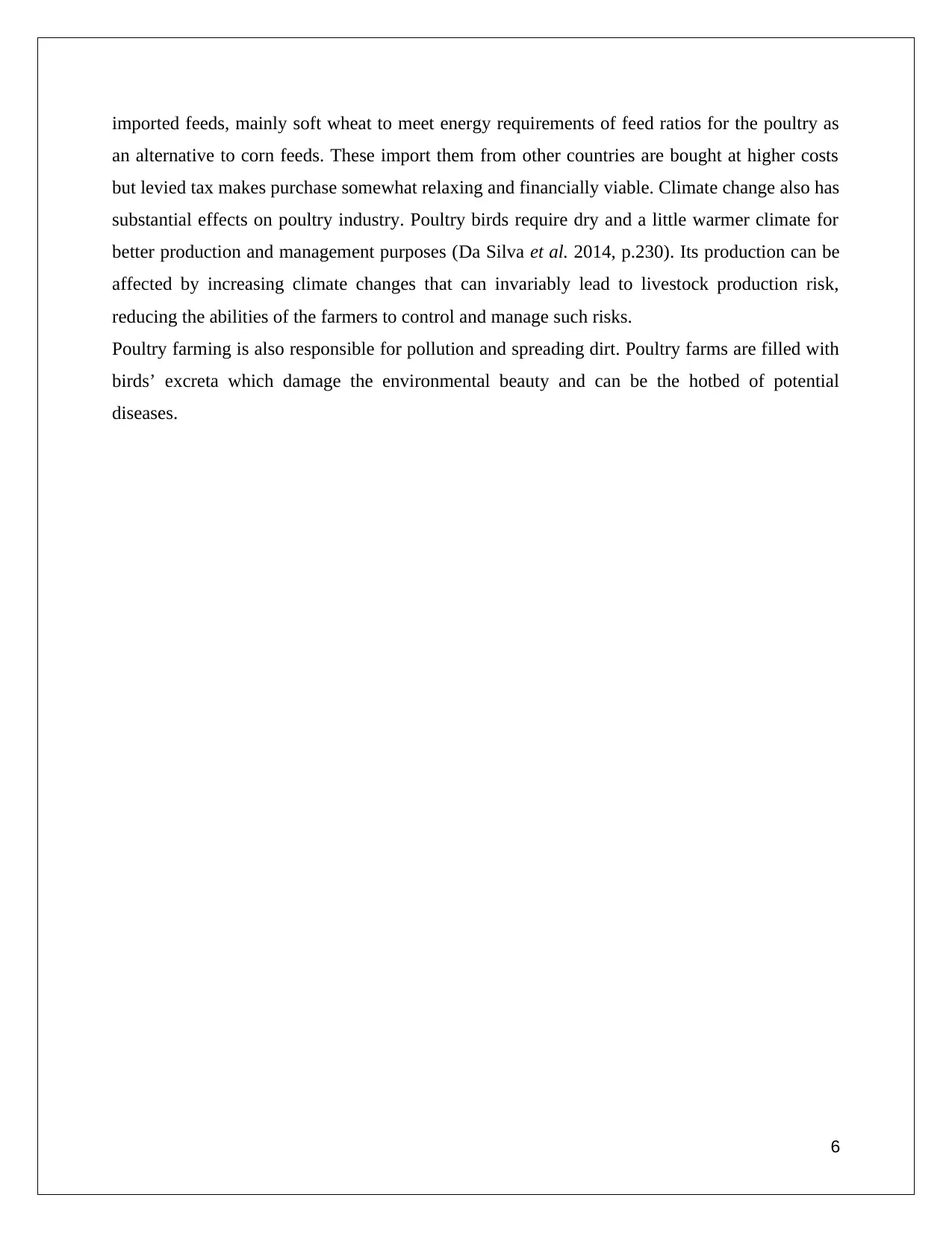
imported feeds, mainly soft wheat to meet energy requirements of feed ratios for the poultry as
an alternative to corn feeds. These import them from other countries are bought at higher costs
but levied tax makes purchase somewhat relaxing and financially viable. Climate change also has
substantial effects on poultry industry. Poultry birds require dry and a little warmer climate for
better production and management purposes (Da Silva et al. 2014, p.230). Its production can be
affected by increasing climate changes that can invariably lead to livestock production risk,
reducing the abilities of the farmers to control and manage such risks.
Poultry farming is also responsible for pollution and spreading dirt. Poultry farms are filled with
birds’ excreta which damage the environmental beauty and can be the hotbed of potential
diseases.
6
an alternative to corn feeds. These import them from other countries are bought at higher costs
but levied tax makes purchase somewhat relaxing and financially viable. Climate change also has
substantial effects on poultry industry. Poultry birds require dry and a little warmer climate for
better production and management purposes (Da Silva et al. 2014, p.230). Its production can be
affected by increasing climate changes that can invariably lead to livestock production risk,
reducing the abilities of the farmers to control and manage such risks.
Poultry farming is also responsible for pollution and spreading dirt. Poultry farms are filled with
birds’ excreta which damage the environmental beauty and can be the hotbed of potential
diseases.
6
⊘ This is a preview!⊘
Do you want full access?
Subscribe today to unlock all pages.

Trusted by 1+ million students worldwide
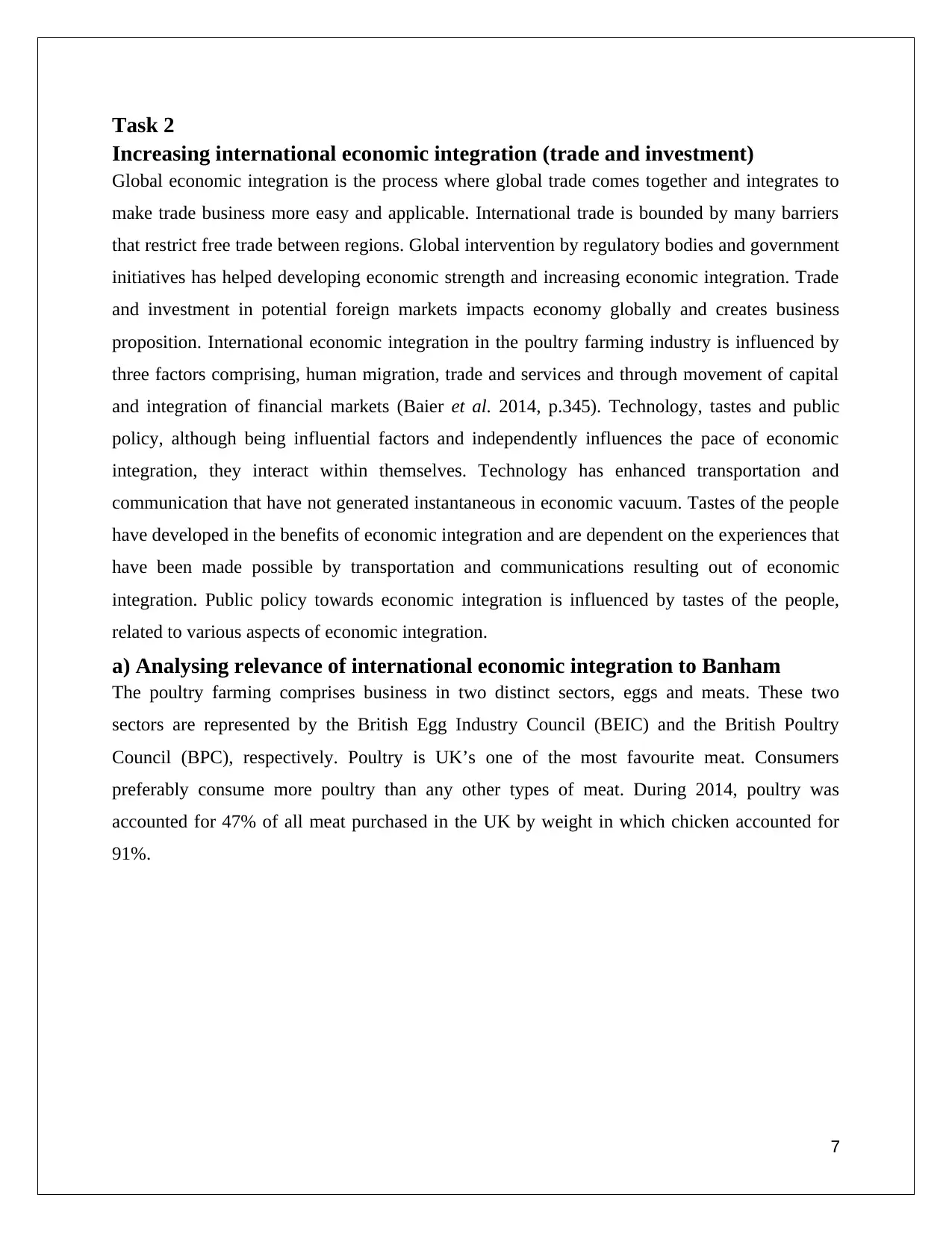
Task 2
Increasing international economic integration (trade and investment)
Global economic integration is the process where global trade comes together and integrates to
make trade business more easy and applicable. International trade is bounded by many barriers
that restrict free trade between regions. Global intervention by regulatory bodies and government
initiatives has helped developing economic strength and increasing economic integration. Trade
and investment in potential foreign markets impacts economy globally and creates business
proposition. International economic integration in the poultry farming industry is influenced by
three factors comprising, human migration, trade and services and through movement of capital
and integration of financial markets (Baier et al. 2014, p.345). Technology, tastes and public
policy, although being influential factors and independently influences the pace of economic
integration, they interact within themselves. Technology has enhanced transportation and
communication that have not generated instantaneous in economic vacuum. Tastes of the people
have developed in the benefits of economic integration and are dependent on the experiences that
have been made possible by transportation and communications resulting out of economic
integration. Public policy towards economic integration is influenced by tastes of the people,
related to various aspects of economic integration.
a) Analysing relevance of international economic integration to Banham
The poultry farming comprises business in two distinct sectors, eggs and meats. These two
sectors are represented by the British Egg Industry Council (BEIC) and the British Poultry
Council (BPC), respectively. Poultry is UK’s one of the most favourite meat. Consumers
preferably consume more poultry than any other types of meat. During 2014, poultry was
accounted for 47% of all meat purchased in the UK by weight in which chicken accounted for
91%.
7
Increasing international economic integration (trade and investment)
Global economic integration is the process where global trade comes together and integrates to
make trade business more easy and applicable. International trade is bounded by many barriers
that restrict free trade between regions. Global intervention by regulatory bodies and government
initiatives has helped developing economic strength and increasing economic integration. Trade
and investment in potential foreign markets impacts economy globally and creates business
proposition. International economic integration in the poultry farming industry is influenced by
three factors comprising, human migration, trade and services and through movement of capital
and integration of financial markets (Baier et al. 2014, p.345). Technology, tastes and public
policy, although being influential factors and independently influences the pace of economic
integration, they interact within themselves. Technology has enhanced transportation and
communication that have not generated instantaneous in economic vacuum. Tastes of the people
have developed in the benefits of economic integration and are dependent on the experiences that
have been made possible by transportation and communications resulting out of economic
integration. Public policy towards economic integration is influenced by tastes of the people,
related to various aspects of economic integration.
a) Analysing relevance of international economic integration to Banham
The poultry farming comprises business in two distinct sectors, eggs and meats. These two
sectors are represented by the British Egg Industry Council (BEIC) and the British Poultry
Council (BPC), respectively. Poultry is UK’s one of the most favourite meat. Consumers
preferably consume more poultry than any other types of meat. During 2014, poultry was
accounted for 47% of all meat purchased in the UK by weight in which chicken accounted for
91%.
7
Paraphrase This Document
Need a fresh take? Get an instant paraphrase of this document with our AI Paraphraser
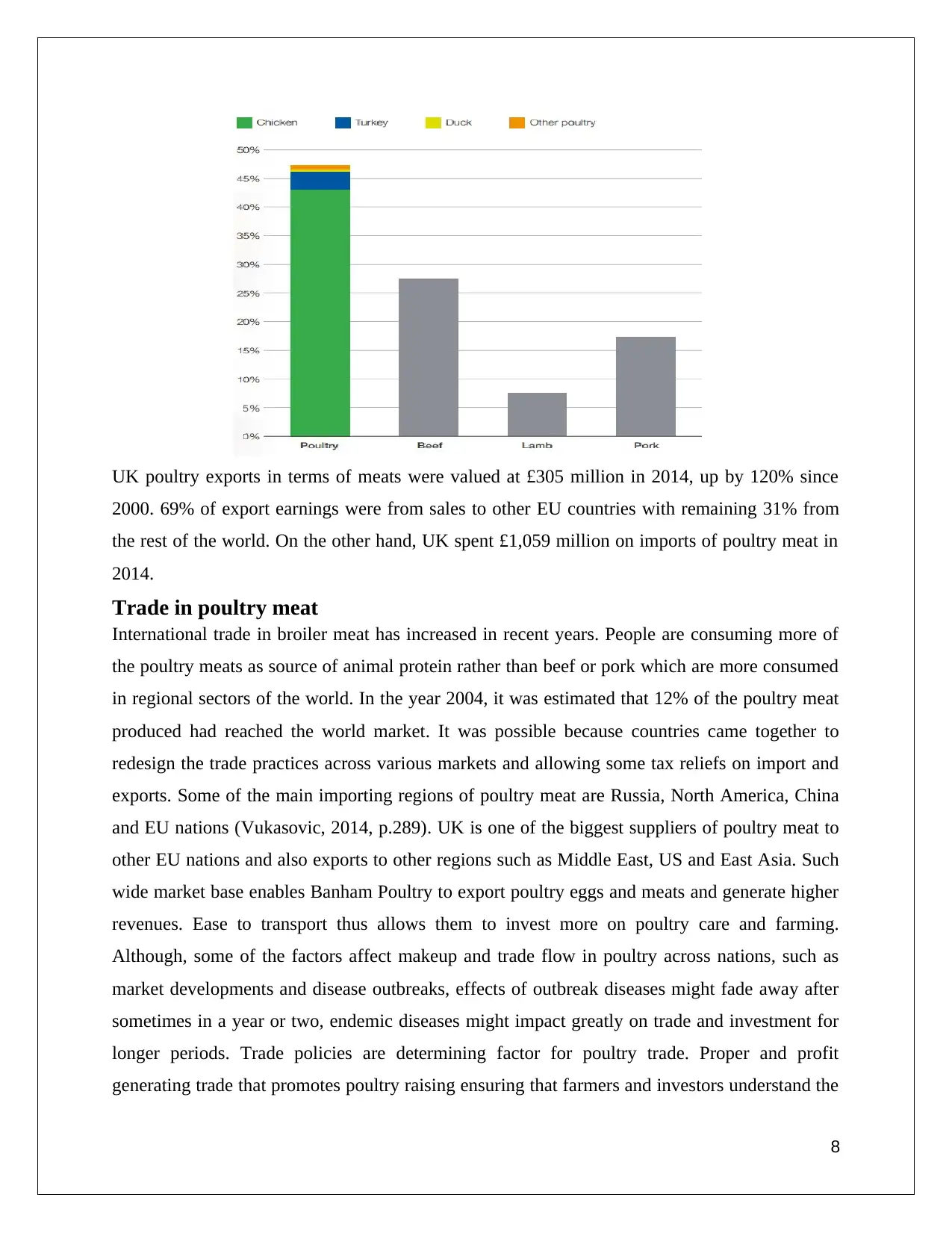
UK poultry exports in terms of meats were valued at £305 million in 2014, up by 120% since
2000. 69% of export earnings were from sales to other EU countries with remaining 31% from
the rest of the world. On the other hand, UK spent £1,059 million on imports of poultry meat in
2014.
Trade in poultry meat
International trade in broiler meat has increased in recent years. People are consuming more of
the poultry meats as source of animal protein rather than beef or pork which are more consumed
in regional sectors of the world. In the year 2004, it was estimated that 12% of the poultry meat
produced had reached the world market. It was possible because countries came together to
redesign the trade practices across various markets and allowing some tax reliefs on import and
exports. Some of the main importing regions of poultry meat are Russia, North America, China
and EU nations (Vukasovic, 2014, p.289). UK is one of the biggest suppliers of poultry meat to
other EU nations and also exports to other regions such as Middle East, US and East Asia. Such
wide market base enables Banham Poultry to export poultry eggs and meats and generate higher
revenues. Ease to transport thus allows them to invest more on poultry care and farming.
Although, some of the factors affect makeup and trade flow in poultry across nations, such as
market developments and disease outbreaks, effects of outbreak diseases might fade away after
sometimes in a year or two, endemic diseases might impact greatly on trade and investment for
longer periods. Trade policies are determining factor for poultry trade. Proper and profit
generating trade that promotes poultry raising ensuring that farmers and investors understand the
8
2000. 69% of export earnings were from sales to other EU countries with remaining 31% from
the rest of the world. On the other hand, UK spent £1,059 million on imports of poultry meat in
2014.
Trade in poultry meat
International trade in broiler meat has increased in recent years. People are consuming more of
the poultry meats as source of animal protein rather than beef or pork which are more consumed
in regional sectors of the world. In the year 2004, it was estimated that 12% of the poultry meat
produced had reached the world market. It was possible because countries came together to
redesign the trade practices across various markets and allowing some tax reliefs on import and
exports. Some of the main importing regions of poultry meat are Russia, North America, China
and EU nations (Vukasovic, 2014, p.289). UK is one of the biggest suppliers of poultry meat to
other EU nations and also exports to other regions such as Middle East, US and East Asia. Such
wide market base enables Banham Poultry to export poultry eggs and meats and generate higher
revenues. Ease to transport thus allows them to invest more on poultry care and farming.
Although, some of the factors affect makeup and trade flow in poultry across nations, such as
market developments and disease outbreaks, effects of outbreak diseases might fade away after
sometimes in a year or two, endemic diseases might impact greatly on trade and investment for
longer periods. Trade policies are determining factor for poultry trade. Proper and profit
generating trade that promotes poultry raising ensuring that farmers and investors understand the
8
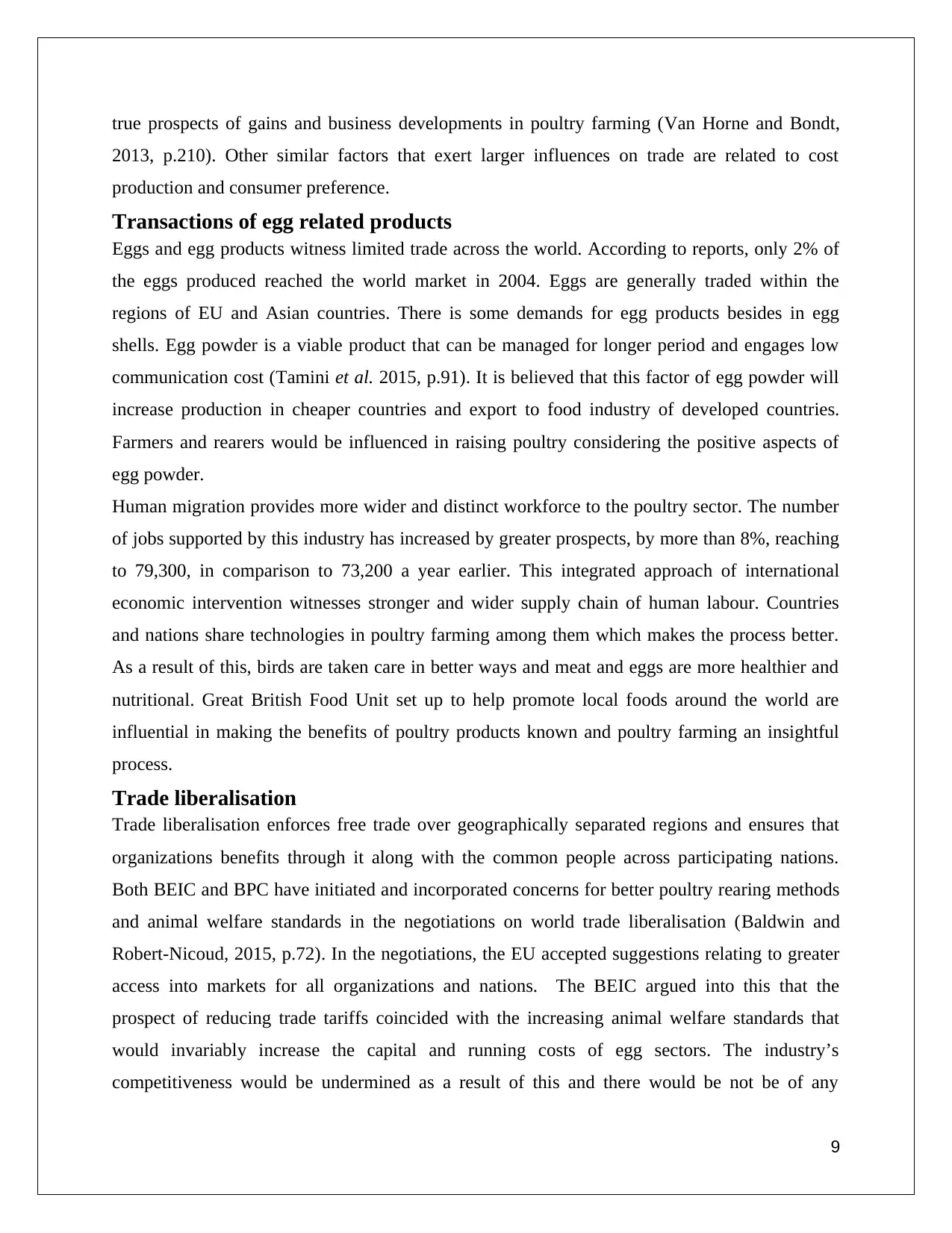
true prospects of gains and business developments in poultry farming (Van Horne and Bondt,
2013, p.210). Other similar factors that exert larger influences on trade are related to cost
production and consumer preference.
Transactions of egg related products
Eggs and egg products witness limited trade across the world. According to reports, only 2% of
the eggs produced reached the world market in 2004. Eggs are generally traded within the
regions of EU and Asian countries. There is some demands for egg products besides in egg
shells. Egg powder is a viable product that can be managed for longer period and engages low
communication cost (Tamini et al. 2015, p.91). It is believed that this factor of egg powder will
increase production in cheaper countries and export to food industry of developed countries.
Farmers and rearers would be influenced in raising poultry considering the positive aspects of
egg powder.
Human migration provides more wider and distinct workforce to the poultry sector. The number
of jobs supported by this industry has increased by greater prospects, by more than 8%, reaching
to 79,300, in comparison to 73,200 a year earlier. This integrated approach of international
economic intervention witnesses stronger and wider supply chain of human labour. Countries
and nations share technologies in poultry farming among them which makes the process better.
As a result of this, birds are taken care in better ways and meat and eggs are more healthier and
nutritional. Great British Food Unit set up to help promote local foods around the world are
influential in making the benefits of poultry products known and poultry farming an insightful
process.
Trade liberalisation
Trade liberalisation enforces free trade over geographically separated regions and ensures that
organizations benefits through it along with the common people across participating nations.
Both BEIC and BPC have initiated and incorporated concerns for better poultry rearing methods
and animal welfare standards in the negotiations on world trade liberalisation (Baldwin and
Robert-Nicoud, 2015, p.72). In the negotiations, the EU accepted suggestions relating to greater
access into markets for all organizations and nations. The BEIC argued into this that the
prospect of reducing trade tariffs coincided with the increasing animal welfare standards that
would invariably increase the capital and running costs of egg sectors. The industry’s
competitiveness would be undermined as a result of this and there would be not be of any
9
2013, p.210). Other similar factors that exert larger influences on trade are related to cost
production and consumer preference.
Transactions of egg related products
Eggs and egg products witness limited trade across the world. According to reports, only 2% of
the eggs produced reached the world market in 2004. Eggs are generally traded within the
regions of EU and Asian countries. There is some demands for egg products besides in egg
shells. Egg powder is a viable product that can be managed for longer period and engages low
communication cost (Tamini et al. 2015, p.91). It is believed that this factor of egg powder will
increase production in cheaper countries and export to food industry of developed countries.
Farmers and rearers would be influenced in raising poultry considering the positive aspects of
egg powder.
Human migration provides more wider and distinct workforce to the poultry sector. The number
of jobs supported by this industry has increased by greater prospects, by more than 8%, reaching
to 79,300, in comparison to 73,200 a year earlier. This integrated approach of international
economic intervention witnesses stronger and wider supply chain of human labour. Countries
and nations share technologies in poultry farming among them which makes the process better.
As a result of this, birds are taken care in better ways and meat and eggs are more healthier and
nutritional. Great British Food Unit set up to help promote local foods around the world are
influential in making the benefits of poultry products known and poultry farming an insightful
process.
Trade liberalisation
Trade liberalisation enforces free trade over geographically separated regions and ensures that
organizations benefits through it along with the common people across participating nations.
Both BEIC and BPC have initiated and incorporated concerns for better poultry rearing methods
and animal welfare standards in the negotiations on world trade liberalisation (Baldwin and
Robert-Nicoud, 2015, p.72). In the negotiations, the EU accepted suggestions relating to greater
access into markets for all organizations and nations. The BEIC argued into this that the
prospect of reducing trade tariffs coincided with the increasing animal welfare standards that
would invariably increase the capital and running costs of egg sectors. The industry’s
competitiveness would be undermined as a result of this and there would be not be of any
9
⊘ This is a preview!⊘
Do you want full access?
Subscribe today to unlock all pages.

Trusted by 1+ million students worldwide
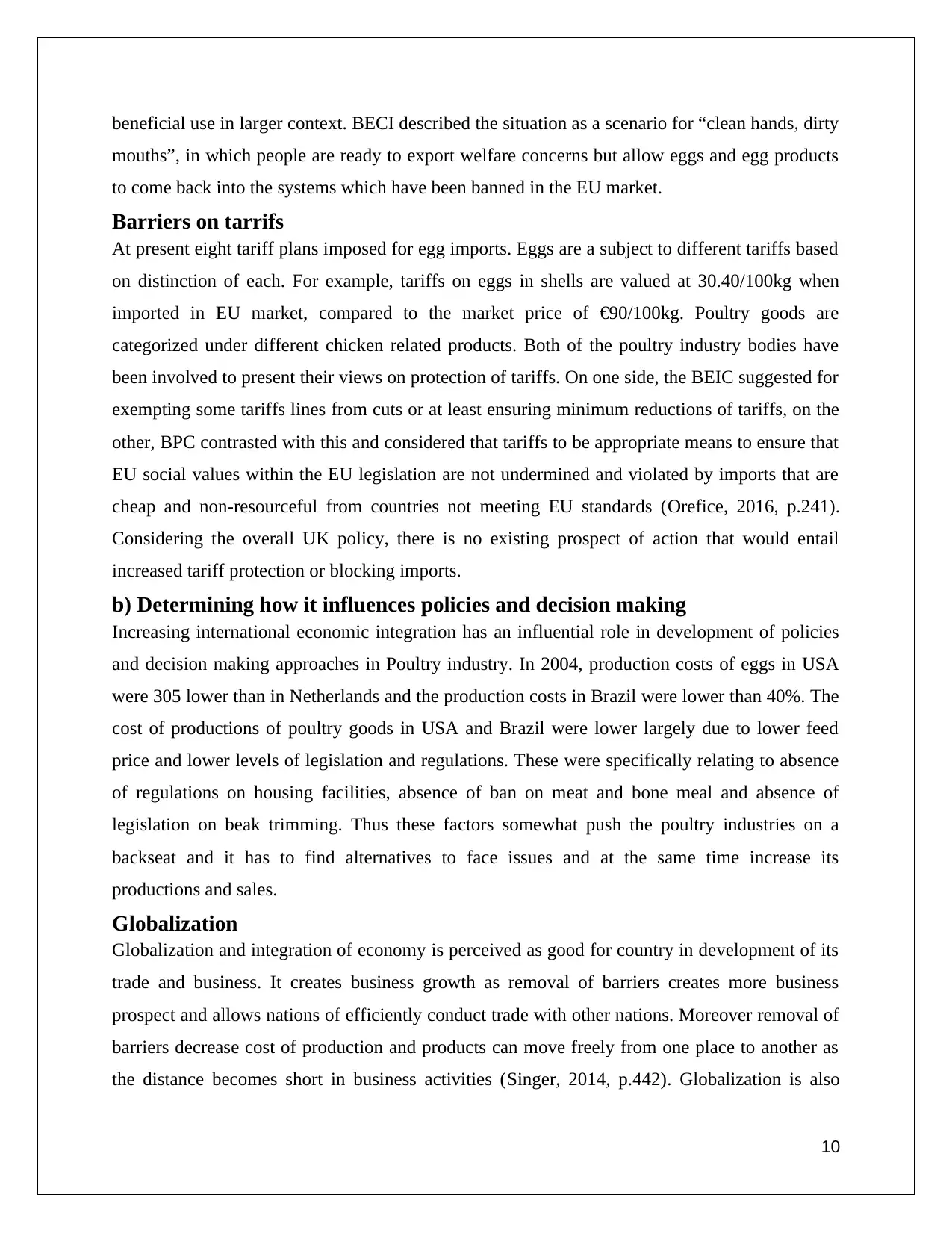
beneficial use in larger context. BECI described the situation as a scenario for “clean hands, dirty
mouths”, in which people are ready to export welfare concerns but allow eggs and egg products
to come back into the systems which have been banned in the EU market.
Barriers on tarrifs
At present eight tariff plans imposed for egg imports. Eggs are a subject to different tariffs based
on distinction of each. For example, tariffs on eggs in shells are valued at 30.40/100kg when
imported in EU market, compared to the market price of €90/100kg. Poultry goods are
categorized under different chicken related products. Both of the poultry industry bodies have
been involved to present their views on protection of tariffs. On one side, the BEIC suggested for
exempting some tariffs lines from cuts or at least ensuring minimum reductions of tariffs, on the
other, BPC contrasted with this and considered that tariffs to be appropriate means to ensure that
EU social values within the EU legislation are not undermined and violated by imports that are
cheap and non-resourceful from countries not meeting EU standards (Orefice, 2016, p.241).
Considering the overall UK policy, there is no existing prospect of action that would entail
increased tariff protection or blocking imports.
b) Determining how it influences policies and decision making
Increasing international economic integration has an influential role in development of policies
and decision making approaches in Poultry industry. In 2004, production costs of eggs in USA
were 305 lower than in Netherlands and the production costs in Brazil were lower than 40%. The
cost of productions of poultry goods in USA and Brazil were lower largely due to lower feed
price and lower levels of legislation and regulations. These were specifically relating to absence
of regulations on housing facilities, absence of ban on meat and bone meal and absence of
legislation on beak trimming. Thus these factors somewhat push the poultry industries on a
backseat and it has to find alternatives to face issues and at the same time increase its
productions and sales.
Globalization
Globalization and integration of economy is perceived as good for country in development of its
trade and business. It creates business growth as removal of barriers creates more business
prospect and allows nations of efficiently conduct trade with other nations. Moreover removal of
barriers decrease cost of production and products can move freely from one place to another as
the distance becomes short in business activities (Singer, 2014, p.442). Globalization is also
10
mouths”, in which people are ready to export welfare concerns but allow eggs and egg products
to come back into the systems which have been banned in the EU market.
Barriers on tarrifs
At present eight tariff plans imposed for egg imports. Eggs are a subject to different tariffs based
on distinction of each. For example, tariffs on eggs in shells are valued at 30.40/100kg when
imported in EU market, compared to the market price of €90/100kg. Poultry goods are
categorized under different chicken related products. Both of the poultry industry bodies have
been involved to present their views on protection of tariffs. On one side, the BEIC suggested for
exempting some tariffs lines from cuts or at least ensuring minimum reductions of tariffs, on the
other, BPC contrasted with this and considered that tariffs to be appropriate means to ensure that
EU social values within the EU legislation are not undermined and violated by imports that are
cheap and non-resourceful from countries not meeting EU standards (Orefice, 2016, p.241).
Considering the overall UK policy, there is no existing prospect of action that would entail
increased tariff protection or blocking imports.
b) Determining how it influences policies and decision making
Increasing international economic integration has an influential role in development of policies
and decision making approaches in Poultry industry. In 2004, production costs of eggs in USA
were 305 lower than in Netherlands and the production costs in Brazil were lower than 40%. The
cost of productions of poultry goods in USA and Brazil were lower largely due to lower feed
price and lower levels of legislation and regulations. These were specifically relating to absence
of regulations on housing facilities, absence of ban on meat and bone meal and absence of
legislation on beak trimming. Thus these factors somewhat push the poultry industries on a
backseat and it has to find alternatives to face issues and at the same time increase its
productions and sales.
Globalization
Globalization and integration of economy is perceived as good for country in development of its
trade and business. It creates business growth as removal of barriers creates more business
prospect and allows nations of efficiently conduct trade with other nations. Moreover removal of
barriers decrease cost of production and products can move freely from one place to another as
the distance becomes short in business activities (Singer, 2014, p.442). Globalization is also
10
Paraphrase This Document
Need a fresh take? Get an instant paraphrase of this document with our AI Paraphraser
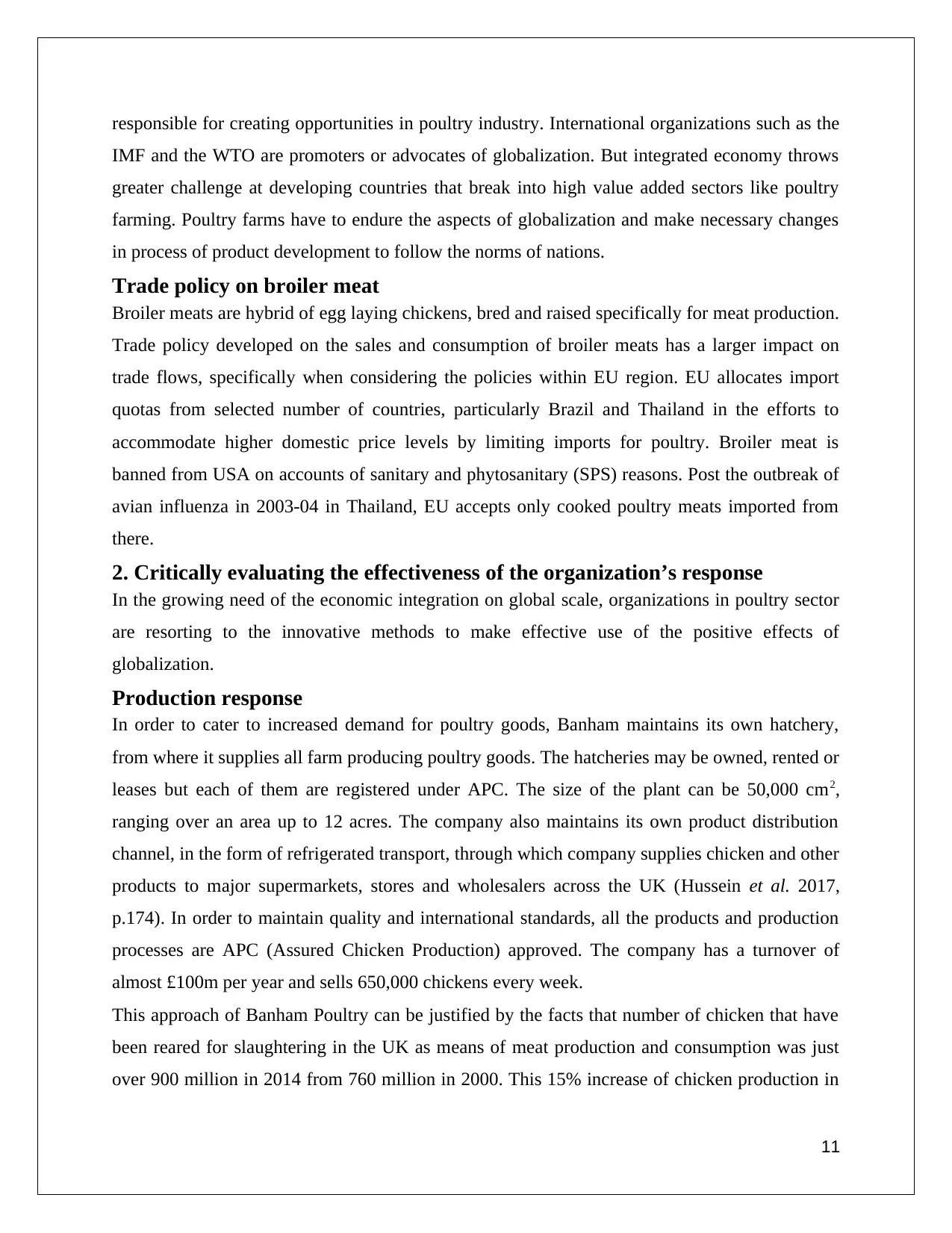
responsible for creating opportunities in poultry industry. International organizations such as the
IMF and the WTO are promoters or advocates of globalization. But integrated economy throws
greater challenge at developing countries that break into high value added sectors like poultry
farming. Poultry farms have to endure the aspects of globalization and make necessary changes
in process of product development to follow the norms of nations.
Trade policy on broiler meat
Broiler meats are hybrid of egg laying chickens, bred and raised specifically for meat production.
Trade policy developed on the sales and consumption of broiler meats has a larger impact on
trade flows, specifically when considering the policies within EU region. EU allocates import
quotas from selected number of countries, particularly Brazil and Thailand in the efforts to
accommodate higher domestic price levels by limiting imports for poultry. Broiler meat is
banned from USA on accounts of sanitary and phytosanitary (SPS) reasons. Post the outbreak of
avian influenza in 2003-04 in Thailand, EU accepts only cooked poultry meats imported from
there.
2. Critically evaluating the effectiveness of the organization’s response
In the growing need of the economic integration on global scale, organizations in poultry sector
are resorting to the innovative methods to make effective use of the positive effects of
globalization.
Production response
In order to cater to increased demand for poultry goods, Banham maintains its own hatchery,
from where it supplies all farm producing poultry goods. The hatcheries may be owned, rented or
leases but each of them are registered under APC. The size of the plant can be 50,000 cm2,
ranging over an area up to 12 acres. The company also maintains its own product distribution
channel, in the form of refrigerated transport, through which company supplies chicken and other
products to major supermarkets, stores and wholesalers across the UK (Hussein et al. 2017,
p.174). In order to maintain quality and international standards, all the products and production
processes are APC (Assured Chicken Production) approved. The company has a turnover of
almost £100m per year and sells 650,000 chickens every week.
This approach of Banham Poultry can be justified by the facts that number of chicken that have
been reared for slaughtering in the UK as means of meat production and consumption was just
over 900 million in 2014 from 760 million in 2000. This 15% increase of chicken production in
11
IMF and the WTO are promoters or advocates of globalization. But integrated economy throws
greater challenge at developing countries that break into high value added sectors like poultry
farming. Poultry farms have to endure the aspects of globalization and make necessary changes
in process of product development to follow the norms of nations.
Trade policy on broiler meat
Broiler meats are hybrid of egg laying chickens, bred and raised specifically for meat production.
Trade policy developed on the sales and consumption of broiler meats has a larger impact on
trade flows, specifically when considering the policies within EU region. EU allocates import
quotas from selected number of countries, particularly Brazil and Thailand in the efforts to
accommodate higher domestic price levels by limiting imports for poultry. Broiler meat is
banned from USA on accounts of sanitary and phytosanitary (SPS) reasons. Post the outbreak of
avian influenza in 2003-04 in Thailand, EU accepts only cooked poultry meats imported from
there.
2. Critically evaluating the effectiveness of the organization’s response
In the growing need of the economic integration on global scale, organizations in poultry sector
are resorting to the innovative methods to make effective use of the positive effects of
globalization.
Production response
In order to cater to increased demand for poultry goods, Banham maintains its own hatchery,
from where it supplies all farm producing poultry goods. The hatcheries may be owned, rented or
leases but each of them are registered under APC. The size of the plant can be 50,000 cm2,
ranging over an area up to 12 acres. The company also maintains its own product distribution
channel, in the form of refrigerated transport, through which company supplies chicken and other
products to major supermarkets, stores and wholesalers across the UK (Hussein et al. 2017,
p.174). In order to maintain quality and international standards, all the products and production
processes are APC (Assured Chicken Production) approved. The company has a turnover of
almost £100m per year and sells 650,000 chickens every week.
This approach of Banham Poultry can be justified by the facts that number of chicken that have
been reared for slaughtering in the UK as means of meat production and consumption was just
over 900 million in 2014 from 760 million in 2000. This 15% increase of chicken production in
11
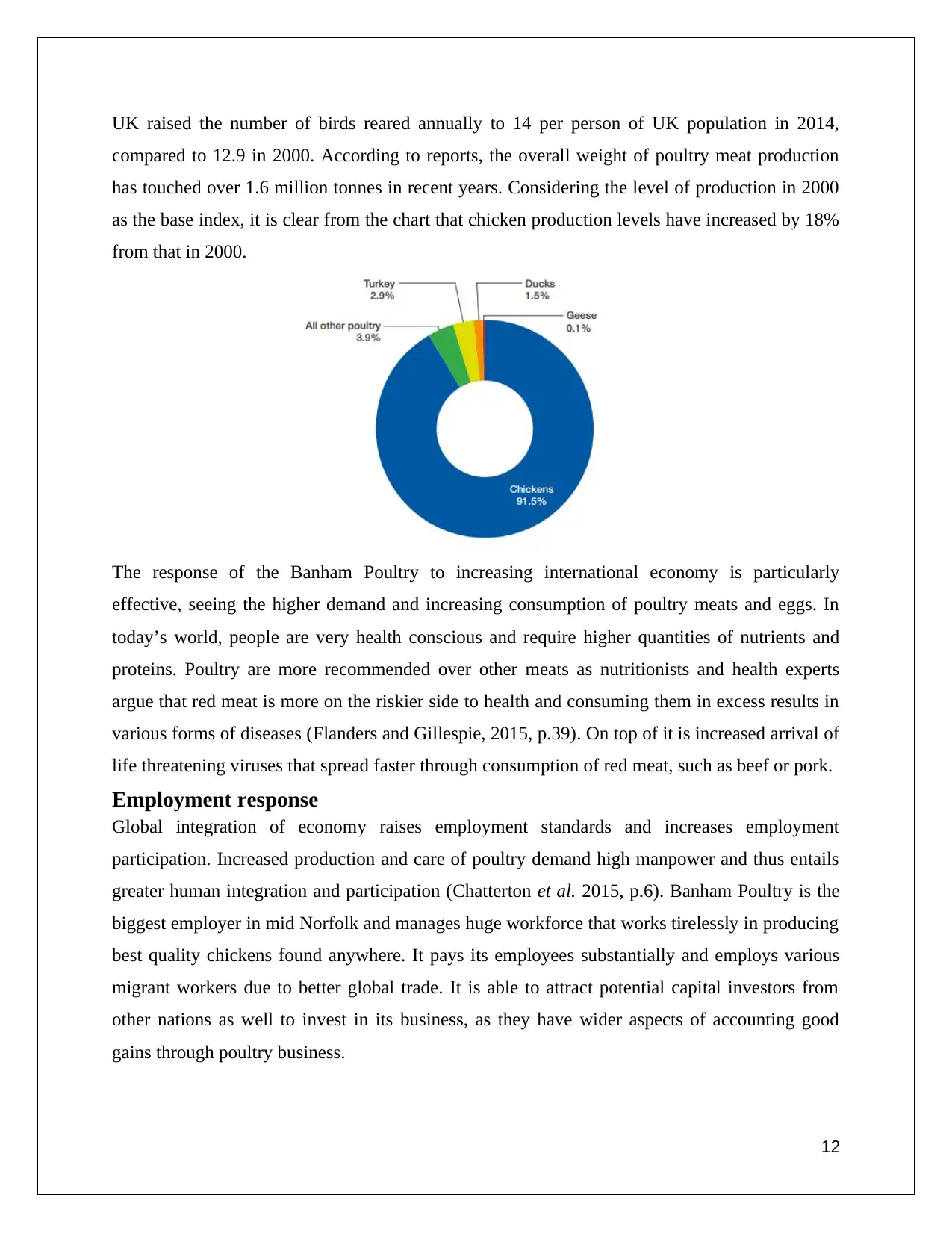
UK raised the number of birds reared annually to 14 per person of UK population in 2014,
compared to 12.9 in 2000. According to reports, the overall weight of poultry meat production
has touched over 1.6 million tonnes in recent years. Considering the level of production in 2000
as the base index, it is clear from the chart that chicken production levels have increased by 18%
from that in 2000.
The response of the Banham Poultry to increasing international economy is particularly
effective, seeing the higher demand and increasing consumption of poultry meats and eggs. In
today’s world, people are very health conscious and require higher quantities of nutrients and
proteins. Poultry are more recommended over other meats as nutritionists and health experts
argue that red meat is more on the riskier side to health and consuming them in excess results in
various forms of diseases (Flanders and Gillespie, 2015, p.39). On top of it is increased arrival of
life threatening viruses that spread faster through consumption of red meat, such as beef or pork.
Employment response
Global integration of economy raises employment standards and increases employment
participation. Increased production and care of poultry demand high manpower and thus entails
greater human integration and participation (Chatterton et al. 2015, p.6). Banham Poultry is the
biggest employer in mid Norfolk and manages huge workforce that works tirelessly in producing
best quality chickens found anywhere. It pays its employees substantially and employs various
migrant workers due to better global trade. It is able to attract potential capital investors from
other nations as well to invest in its business, as they have wider aspects of accounting good
gains through poultry business.
12
compared to 12.9 in 2000. According to reports, the overall weight of poultry meat production
has touched over 1.6 million tonnes in recent years. Considering the level of production in 2000
as the base index, it is clear from the chart that chicken production levels have increased by 18%
from that in 2000.
The response of the Banham Poultry to increasing international economy is particularly
effective, seeing the higher demand and increasing consumption of poultry meats and eggs. In
today’s world, people are very health conscious and require higher quantities of nutrients and
proteins. Poultry are more recommended over other meats as nutritionists and health experts
argue that red meat is more on the riskier side to health and consuming them in excess results in
various forms of diseases (Flanders and Gillespie, 2015, p.39). On top of it is increased arrival of
life threatening viruses that spread faster through consumption of red meat, such as beef or pork.
Employment response
Global integration of economy raises employment standards and increases employment
participation. Increased production and care of poultry demand high manpower and thus entails
greater human integration and participation (Chatterton et al. 2015, p.6). Banham Poultry is the
biggest employer in mid Norfolk and manages huge workforce that works tirelessly in producing
best quality chickens found anywhere. It pays its employees substantially and employs various
migrant workers due to better global trade. It is able to attract potential capital investors from
other nations as well to invest in its business, as they have wider aspects of accounting good
gains through poultry business.
12
⊘ This is a preview!⊘
Do you want full access?
Subscribe today to unlock all pages.

Trusted by 1+ million students worldwide
1 out of 15
Your All-in-One AI-Powered Toolkit for Academic Success.
+13062052269
info@desklib.com
Available 24*7 on WhatsApp / Email
![[object Object]](/_next/static/media/star-bottom.7253800d.svg)
Unlock your academic potential
Copyright © 2020–2026 A2Z Services. All Rights Reserved. Developed and managed by ZUCOL.
